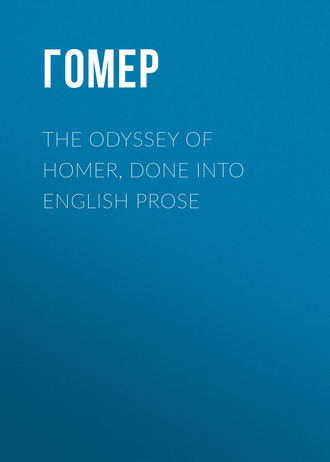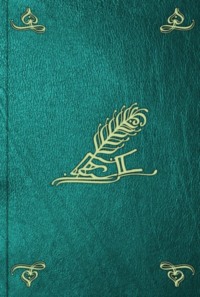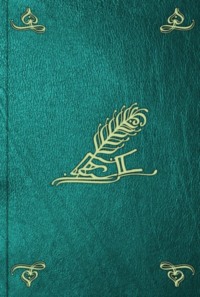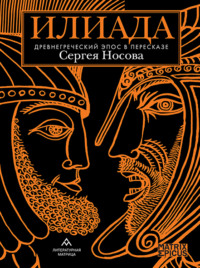 полная версия
полная версияThe Odyssey of Homer, Done into English Prose
'Eumaeus, verily this is a great marvel, this hound lying here in the dung. Truly he is goodly of growth, but I know not certainly if he have speed with this beauty, or if he be comely only, like as are men's trencher dogs that their lords keep for the pleasure of the eye.'
Then didst thou make answer, swineherd Eumaeus: 'In very truth this is the dog of a man that has died in a far land. If he were what once he was in limb and in the feats of the chase, when Odysseus left him to go to Troy, soon wouldst thou marvel at the sight of his swiftness and his strength. There was no beast that could flee from him in the deep places of the wood, when he was in pursuit; for even on a track he was the keenest hound. But now he is holden in an evil case, and his lord hath perished far from his own country, and the careless women take no charge of him. Nay, thralls are no more inclined to honest service when their masters have lost the dominion, for Zeus, of the far-borne voice, takes away the half of a man's virtue, when the day of slavery comes upon him.'
Therewith he passed within the fair-lying house, and went straight to the hall, to the company of the proud wooers. But upon Argos came the fate of black death even in the hour that he beheld Odysseus again, in the twentieth year.
Now godlike Telemachus was far the first to behold the swineherd as he came into the hall, and straightway then he beckoned and called him to his side. So Eumaeus looked about and took a settle that lay by him, where the carver was wont to sit dividing much flesh among the wooers that were feasting in the house. This seat he carried and set by the table of Telemachus over against him, and there sat down himself. And the henchman took a mess and served it him, and wheaten bread out of the basket.
And close behind him Odysseus entered the house in the guise of a beggar, a wretched man and an old, leaning on his staff, and clothed on with sorry raiment. And he sat down on the ashen threshold within the doorway, leaning against a pillar of cypress wood, which the carpenter on a time had deftly planed, and thereon made straight the line. And Telemachus called the swineherd to him, and took a whole loaf out of the fair basket, and of flesh so much as his hands could hold in their grasp, saying:
'Take and give this to the stranger, and bid him go about and beg himself of all the wooers in their turn, for shame is an ill mate of a needy man.'
So he spake, and the swineherd went when he heard that saying, and stood by and spake to him winged words:
'Stranger, Telemachus gives thee these and bids thee go about and beg of all the wooers in their turn, for, he says, "shame ill becomes a beggar man."'
Then Odysseus of many counsels answered him and said: 'King Zeus, grant me that Telemachus may be happy among men, and may he have all his heart's desire!'
Therewith he took the gift in both hands, and set it there before his feet on his unsightly scrip. Then he ate meat so long as the minstrel was singing in the halls. When he had done supper, and the divine minstrel was ending his song, then the wooers raised a clamour through the halls; but Athene stood by Odysseus, son of Laertes, and moved him to go gathering morsels of bread among the wooers, and learn which were righteous and which unjust. Yet not even so was she fated to redeem one man of them from an evil doom. So he set out, beginning on the right, to ask of each man, stretching out his hand on every side, as though he were a beggar from of old. And they in pity gave him somewhat, and were amazed at the man, asking one another who he was and whence he came?
Then Melanthius, the goatherd, spake among them:
'Listen, ye wooers of the renowned queen, concerning this stranger, for verily I have seen him before. The swineherd truly was his guide hither, but of him I have no certain knowledge, whence he avows him to be born.'
So spake he, but Antinous rebuked the swineherd, saying: 'Oh notorious swineherd, wherefore, I pray thee, didst thou bring this man to the city? Have we not vagrants enough besides, plaguy beggars, kill-joys of the feast? Dost thou count it a light thing that they assemble here and devour the living of thy master, but thou must needs29 call in this man too?'
Then didst thou make answer, swineherd Eumaeus: 'Antinous, no fair words are these of thine, noble though thou art. For who ever himself seeks out and bids to the feast a stranger from afar, save only one of those that are craftsmen of the people, a prophet or a healer of ills, or a shipwright or even a godlike minstrel, who can delight all with his song? Nay, these are the men that are welcome over all the wide earth. But none would call a beggar to the banquet, to waste his substance. But thou art ever hard above all the other wooers to the servants of Odysseus, and, beyond all, to me; but behold, I care not, so long as my mistress, the constant Penelope, lives in the halls and godlike Telemachus.'
Then wise Telemachus answered him, saying: 'Be silent, answer him not, I pray thee, with many words, for Antinous is wont ever to chide us shamefully with bitter speech, yea, and urges the others thereto.'
Therewithal he spake winged words to Antinous: 'Antinous, verily thou hast a good care for me, as it were a father for his son, thou that biddest me drive our guest from the hall with a harsh command. God forbid that such a thing should be! Take somewhat and give it him: lo, I grudge it not; nay, I charge thee to do it. And herein regard not my mother, nor any of the thralls that are in the house of divine Odysseus. Nay, but thou hast no such thought in thy heart, for thou art far more fain to eat thyself than to give to another.'
Then Antinous answered him and spake, saying: 'Telemachus, proud of speech, and unrestrained in fury, what word hast thou spoken? If all the wooers should vouchsafe him as much as I, this house would keep him far enough aloof even for three months' space.'
So he spake, and seized the footstool whereon he rested his sleek feet as he sat at the feast, and showed it from beneath the table where it lay. But all the others gave somewhat and filled the wallet with bread and flesh; yea, and even now, Odysseus as he returned to the threshold, was like to escape scot free, making trial of the Achaeans, but he halted by Antinous, and spake to him, saying:
'Friend, give me somewhat; for methinks thou art not the basest of the Achaeans, but the best man of them all, for thou art like a king. Wherefore thou shouldest give me a portion of bread, and that a better than the others; so would I make thee renowned over all the wide earth. For I too, once had a house of mine own among men, a rich man with a wealthy house, and many a time would I give to a wanderer, what manner of man soever he might be, and in whatsoever need he came. And I had thralls out of number, and all else in plenty, wherewith folk live well and have a name for riches. But Zeus, the son of Cronos, made me desolate of all, – for surely it was his will, – who sent me with wandering sea-robbers to go to Egypt, a far road, to my ruin. And in the river Aegyptus I stayed my curved ships. Then verily I bade my loved companions to abide there by the ships, and to guard the ship, and I sent forth scouts to range the points of outlook. Now they gave place to wantonness, being the fools of their own force, and soon they fell to wasting the fields of the Egyptians, exceeding fair, and carried away their wives and infant children, and slew the men. And the cry came quickly to the city, and the people heard the shout and came forth at the breaking of the day; and all the plain was filled with footmen and horsemen and with the glitter of bronze. And Zeus, whose joy is in the thunder, sent an evil panic upon my company, and none durst stand and face the foe: for danger encompassed us on every side. There they slew many of us with the edge of the sword, and others they led up with them alive to work for them perforce. But they gave me to a friend who met them, to take to Cyprus, even to Dmetor son of Iasus, who ruled mightily over Cyprus; and thence, behold, am I now come hither in sore distress.'
Then Antinous answered, and spake, saying: 'What god hath brought this plague hither to trouble the feast? Stand forth thus in the midst, away from my table, lest thou come soon to a bitter Egypt and a sad Cyprus; for a bold beggar art thou and a shameless. Thou standest by all in turn and recklessly they give to thee, for they hold not their hand nor feel any ruth in giving freely of others' goods, for that each man has plenty by him.'
Then Odysseus of many counsels drew back and answered him: 'Lo now, I see thou hast not wisdom with thy beauty! From out of thine own house thou wouldest not give even so much as a grain of salt to thy suppliant, thou who now even at another's board dost sit, and canst not find it in thy heart to take of the bread and give it me, where there is plenty to thy hand.'
He spake, and Antinous was mightily angered at heart, and looked fiercely on him and spake winged words:
'Henceforth, methinks, thou shalt not get thee out with honour from the hall, seeing thou dost even rail upon me.'
Therewith he caught up the foot-stool and smote Odysseus at the base of the right shoulder by the back. But he stood firm as a rock, nor reeled he beneath the blow of Antinous, but shook his head in silence, brooding evil in the deep of his heart. Then he went back to the threshold, and sat him there, and laid down his well-filled scrip, and spake among the wooers:
'Hear me, ye wooers of the renowned queen, and I will say what my spirit within me bids me. Verily there is neither pain nor grief of heart, when a man is smitten in battle fighting for his own possessions, whether cattle or white sheep. But now Antinous hath stricken me for my wretched belly's sake, a thing accursed, that works much ill for men. Ah, if indeed there be gods and Avengers of beggars, may the issues of death come upon Antinous before his wedding!'
Then Antinous, son of Eupeithes, answered him: 'Sit and eat thy meat in quiet, stranger, or get thee elsewhere, lest the young men drag thee by hand or foot through the house for thy evil words, and strip all thy flesh from off thee.'
Even so he spake, and they were all exceeding wroth at his word. And on this wise would one of the lordly young men speak:
'Antinous, thou didst ill to strike the hapless wanderer, doomed man that thou art, – if indeed there be a god in heaven. Yea and the gods, in the likeness of strangers from far countries, put on all manner of shapes, and wander through the cities, beholding the violence and the righteousness of men.'
So the wooers spake, but he heeded not their words. Now Telemachus nursed in his heart a mighty grief at the smiting of Odysseus, yet he let no tear fall from his eyelids to the ground, but shook his head in silence, brooding evil in the deep of his heart.
Now when wise Penelope heard of the stranger being smitten in the halls, she spake among her maidens, saying:
'Oh that Apollo, the famed archer, may so smite thee thyself, Antinous!'
And the house-dame, Eurynome, answered her, saying: 'Oh that we might win fulfilment of our prayers! So should not one of these men come to the fair-throned Dawn.'
And wise Penelope answered her: 'Nurse, they are all enemies, for they all devise evil continually, but of them all Antinous is the most like to black fate. Some hapless stranger is roaming about the house, begging alms of the men, as his need bids him; and all the others filled his wallet and gave him somewhat, but Antinous smote him at the base of the right shoulder with a stool.'
So she spake among her maidens, sitting in her chamber, while goodly Odysseus was at meat. Then she called to her the goodly swineherd and spake, saying:
'Go thy way, goodly Eumaeus, and bid the stranger come hither, that I may speak him a word of greeting, and ask him if haply he has heard tidings of Odysseus of the hardy heart, or seen him with his eyes; for he seems like one that has wandered far.'
Then didst thou make answer, swineherd Eumaeus: 'Queen, oh that the Achaeans would hold their peace! so would he charm thy very heart, such things doth he say. For I kept him three nights and three days I held him in the steading, for to me he came first when he fled from the ship, yet he had not made an end of the tale of his affliction. Even as when a man gazes on a singer, whom the gods have taught to sing words of yearning joy to mortals, and they have a ceaseless desire to hear him, so long as he will sing; even so he charmed me, sitting by me in the halls. He says that he is a friend of Odysseus and of his house, one that dwells in Crete, where is the race of Minos. Thence he has come hither even now, with sorrow by the way, onward and yet onward wandering; and he stands to it that he has heard tidings of Odysseus nigh at hand and yet alive in the fat land of the men of Thesprotia; and he is bringing many treasures to his home.'
Then wise Penelope answered him, saying: 'Go, call him hither, that he may speak to me face to face. But let these men sit in the doorway and take their pleasure, or even here in the house, since their heart is glad. For their own wealth lies unspoiled at home, bread and sweet wine, and thereon do their servants feed. But they resorting to our house day by day sacrifice oxen and sheep and fat goats, and keep revel and drink the dark wine recklessly; and, lo, our great wealth is wasted, for there is no man now alive, such as Odysseus was, to keep ruin from the house. Oh, if Odysseus might come again to his own country; soon would he and his son avenge the violence of these men!'
Even so she spake, and Telemachus sneezed loudly, and around the roof rang wondrously. And Penelope laughed, and straightway spake to Eumaeus winged words:
'Go, call me the stranger, even so, into my presence. Dost thou not mark how my son has sneezed a blessing on all my words? Wherefore no half-wrought doom shall befal the wooers every one, nor shall any avoid death and the fates. Yet another thing will I say, and do thou ponder it in thy heart. If I shall find that he himself speaks nought but truth, I will clothe him with a mantle and a doublet, goodly raiment.'
So she spake, and the swineherd departed when he heard that saying, and stood by the stranger and spake winged words:
'Father and stranger, wise Penelope, the mother of Telemachus, is calling for thee, and her mind bids her inquire as touching her lord, albeit she has sorrowed much already. And if she shall find that thou dost speak nought but truth, she will clothe thee in a mantle and a doublet, whereof thou standest most in need. Moreover thou shalt beg thy bread through the land and shalt fill thy belly, and whosoever will, shall give to thee.'
Then the steadfast goodly Odysseus answered him, saying: 'Eumaeus, soon would I tell all the truth to the daughter of Icarius, wise Penelope, for well I know his story, and we have borne our travail together. But I tremble before the throng of the froward wooers, whose outrage and violence reach even to the iron heaven. For even now, as I was going through the house, when this man struck and pained me sore, and that for no ill deed, neither Telemachus nor any other kept off the blow. Wherefore now, bid Penelope tarry in the chambers, for all her eagerness, till the going down of the sun, and then let her ask me concerning her lord, as touching the day of his returning, and let her give me a seat yet nearer to the fire, for behold, I have sorry raiment, and thou knowest it thyself, since I made my supplication first to thee.'
Even so he spake, and the swineherd departed when he heard that saying. And as he crossed the threshold Penelope spake to him:
'Thou bringest him not, Eumaeus: what means the wanderer hereby? Can it be that he fears some one out of measure, or is he even ashamed of tarrying in the house? A shamefaced man makes a bad beggar.'
Then didst thou make answer, swineherd Eumaeus: 'He speaks aright, and but as another would deem, in that he shuns the outrage of overweening men. Rather would he have thee wait till the going down of the sun. Yea, and it is far meeter for thyself, O queen, to utter thy word to the stranger alone, and to listen to his speech.'
Then the wise Penelope answered: 'Not witless is the stranger; even as he deems, so it well may be.30 For there are no mortal men, methinks, so wanton as these, and none that devise such infatuate deeds.'
So she spake, and the goodly swineherd departed into the throng of the wooers, when he had showed her all his message. And straightway he spake to Telemachus winged words, holding his head close to him, that the others might not hear:
'Friend, I am going hence to look after thy swine and the things of the farm, thy livelihood and mine; but do thou take charge of all that is here. Yet first look to thyself and take heed that no evil comes nigh thee, for many of the Achaeans have ill will against us, whom may Zeus confound before their mischief falls on us!'
And wise Telemachus answered him, and said: 'Even so shall it be, father; and do thou get thee on thy way, when thou hast supped. And in the morning come again, and bring fair victims for sacrifice. And all these matters will be a care to me and to the deathless gods.'
Thus he spake, and the other sat down again on the polished settle; and when he had satisfied his heart with meat and drink, he went on his way to the swine, leaving the courts and the hall full of feasters; and they were making merry with dance and song, for already it was close on eventide.
Book XVIII
The fighting at fists of Odysseus with Irus. His admonitions to Amphinomus. Penelope appears before the wooers, and draws presents from them.
Then up came a common beggar, who was wont to beg through the town of Ithaca, one that was known among all men for ravening greed, for his endless eating and drinking, yet he had no force or might, though he was bulky enough to look on. Arnaeus was his name, for so had his good mother given it him at his birth, but all the young men called him Irus, because he ran on errands, whensoever any might bid him. So now he came, and would have driven Odysseus from his own house, and began reviling him, and spake winged words:
'Get thee hence, old man, from the doorway, lest thou be even haled out soon by the foot. Seest thou not that all are now giving me the wink, and bidding me drag thee forth? Nevertheless, I feel shame of the task. Nay get thee up, lest our quarrel soon pass even to blows.'
Then Odysseus of many counsels looked fiercely on him, and spake saying: 'Sir, neither in deed nor word do I harm thee, nor do I grudge that any should give to thee, yea though it were a good handful. But this threshold will hold us both, and thou hast no need to be jealous for the sake of other men's goods. Thou seemest to me to be a wanderer, even as I am, and the gods it is that are like to give us gain. Only provoke me not overmuch to buffeting, lest thou anger me, and old though I be I defile thy breast and lips with blood. Thereby should I have the greater quiet to-morrow, for methinks that thou shalt never again come to the hall of Odysseus, son of Laertes'.
Then the beggar Irus spake unto him in anger: 'Lo now, how trippingly and like an old cinder-wife this glutton speaks, on whom I will work my evil will, and smite him right and left, and drive all the teeth from his jaws to the ground, like the tusks of a swine that spoils the corn. Gird thyself now, that even these men all may know our mettle in fight. Nay, how shouldst thou do battle with a younger man than thou?'
Thus did they whet each the other's rage right manfully before the lofty doors upon the polished threshold. And the mighty prince Antinous heard the twain, and sweetly he laughed out, and spake among the wooers:
'Friends, never before has there been such a thing; such goodly game has a god brought to this house. The stranger yonder and Irus are bidding each other to buffets. Quick, let us match them one against the other.'
Then all at the word leaped up laughing, and gathered round the ragged beggars, and Antinous, son of Eupeithes, spake among them saying: 'Hear me, ye lordly wooers, and I will say somewhat. Here are goats' bellies lying at the fire, that we laid by at supper-time and filled with fat and blood. Now whichsoever of the twain wins, and shows himself the better man, let him stand up and take his choice of these puddings. And further, he shall always eat at our feasts, nor will we suffer any other beggar to come among us and ask for alms.'
So spake Antinous, and the saying pleased them well. Then
Odysseus of many counsels spake among them craftily:
'Friends, an old man and foredone with travail may in no wise fight with a younger. But my belly's call is urgent on me, that evil-worker, to the end that I may be subdued with stripes. But come now, swear me all of you a strong oath, so that none, for the sake of shewing a favour to Irus, may strike me a foul blow with heavy hand and subdue me by violence to my foe.'
So he spake, and they all swore not to strike him, as he bade them. Now when they had sworn and done that oath, the mighty prince Telemachus once more spake among them:
'Stranger, if thy heart and lordly spirit urge thee to rid thee of this fellow, then fear not any other of the Achaeans, for whoso strikes thee shall have to fight with many. Thy host am I, and the princes consent with me, Antinous and Eurymachus, men of wisdom both.'
So spake he and they all consented thereto. Then Odysseus girt his rags about his loins, and let his thighs be seen, goodly and great, and his broad shoulders and breast and mighty arms were manifest. And Athene came nigh and made greater the limbs of the shepherd of the people. Then the wooers were exceedingly amazed, and thus would one speak looking to his neighbour:
'Right soon will Irus, un-Irused, have a bane of his own bringing, such a thigh as that old man shows from out his rags!'
So they spake, and the mind of Irus was pitifully stirred; but even so the servants girded him and led him out perforce in great fear, his flesh trembling on his limbs. Then Antinous chid him, and spake and hailed him:
'Thou lubber, better for thee that thou wert not now, nor ever hadst been born, if indeed thou tremblest before this man, and art so terribly afraid; an old man too he is, and foredone with the travail that is come upon him. But I will tell thee plainly, and it shall surely be accomplished. If this man prevail against thee and prove thy master, I will cast thee into a black ship, and send thee to the mainland to Echetus the king, the maimer of all mankind, who will cut off thy nose and ears with the pitiless steel, and draw out thy vitals and give them raw to dogs to rend.'
So he spake, and yet greater trembling gat hold of the limbs of Irus, and they led him into the ring, and the twain put up their hands. Then the steadfast goodly Odysseus mused in himself whether he should smite him in such wise that his life should leave his body, even there where he fell, or whether he should strike him lightly, and stretch him on the earth. And as he thought thereon, this seemed to him the better way, to strike lightly, that the Achaeans might not take note of him, who he was. Then the twain put up their hands, and Irus struck at the right shoulder, but the other smote him on his neck beneath the ear, and crushed in the bones, and straightway the red blood gushed up through his mouth, and with a moan he fell in the dust, and drave together his teeth as he kicked the ground. But the proud wooers threw up their hands, and died outright for laughter. Then Odysseus seized him by the foot, and dragged him forth through the doorway, till he came to the courtyard and the gates of the gallery, and he set him down and rested him against the courtyard wall, and put his staff in his hands, and uttering his voice spake to him winged words:
'Sit thou there now, and scare off swine and dogs, and let not such an one as thou be lord over strangers and beggars, pitiful as thou art, lest haply some worse thing befal thee.'
Thus he spake, and cast about his shoulders his mean scrip all tattered, and the cord therewith to hang it, and he gat him back to the threshold, and sat him down there again. Now the wooers went within laughing sweetly, and greeted him, saying:
'May Zeus, stranger, and all the other deathless gods give thee thy dearest wish, even all thy heart's desire, seeing that thou hast made that insatiate one to cease from his begging in the land! Soon will we take him over to the mainland, to Echetus the king, the maimer of all mankind.'









